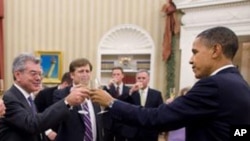The Obama administration says limiting U.S. and Russian tactical nuclear weapons will be its next arms control goal after Wednesday's Senate ratification of the new strategic arms reduction treaty with Moscow. U.S. officials say they expect mutual strategic arms inspections, which stopped a year ago, to be underway again by April.
While still celebrating the Senate ratification vote, administration officials are already setting their sights on a new and possibly more difficult task - limiting U.S. and Russian stockpiles of tactical nuclear weapons.
That broad category includes nuclear devices in the form of landmines, artillery shells, and short-range missile warheads, which are much smaller and pose a greater proliferation risk than the long range strategic arms covered in the New Start treaty.
In a telephone conference call with reporters, Assistant Secretary of State for Arms Control, Verification and Compliance Rose Gottemoller said President Obama and U.S. Senators of both parties are keen to move on to tactical weapons.
"The Russians have a larger number than we do of these systems, and there has been some particular, I would say strong, urging from Capital Hill that we move out," said Gottemoller. "Well, that is something that President Obama had already spoken about when he signed the (New Start) treaty in Prague in April of 2010. He said we would be moving on next to address reductions in tactical nuclear weapons and also in non-deployed nuclear weapons - that is, weapons in storage facilities."
Russia is believed to have several thousand tactical weapons while the United States may have fewer than one thousand, with only a fraction of those based in Europe.
Moscow has long insisted that all U.S. tactical weapons be removed from Europe before talks can begin. Gottemoeller said Russia may be softening its position on that, but she would not predict that negotiations on the issue will get underway before the end of 2011.
Gottemoeller, the lead U.S. negotiator on the New Start treaty, said she expects Russian ratification of the accord to be completed by late January or early February, and said the critical process of mutual on-site inspections would begin 60 days after that.
Fifteen years of inspection visits to U.S. and Russian strategic nuclear weapons sites ended with the expiration of the previous accord more than a year ago. Gottemoeller said further prolongation of the inspection lapse would have undermined mutual trust.
"It leads to worst-case planning. It leads to budgetary expenditures based on worst-case planning. And those are the kinds of concerns that were very, very important for our military," Gottemoller said. "So I'm frankly glad that we will be restoring the inspection regime, and be moving back to directly monitoring each others' strategic forces within 60 days of the entry-into-force of the New Start treaty."
The arms negotiator said the bruising partisan struggle over the treaty in the Senate, which ended with Wednesday's 71-to-26 vote may be helpful to long-range arms control efforts as it raised public interest in such issues and brought a new generation of U.S. Senators into the debate.
US: Tactical Nuclear Weapons Deal with Moscow Next











